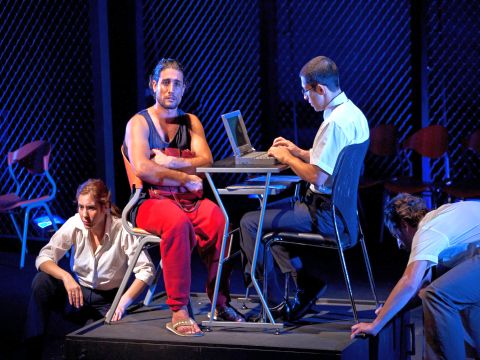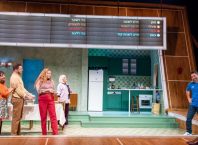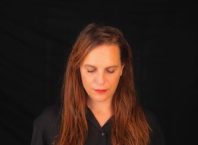
In The Promised Land, Shay Pitovsky and Shahar Pinkas have created a moving and provocative play, certain to generate vital discourse on the urgent and sensitive issue of refugees.
The Promised Land is a work of documentary theatre, based on research and interviews, including a weekly theatre workshop conducted with refugee boys from Darfur. There are somewhere between 27,000 – 37,000 refugees and asylum seekers currently in Israel. Escaping the daily violence of oppressive regimes, enduring the hazards of the long journey on foot, and confronted with a different language and culture, in addition to the difficulties of acquiring legal status and sustenance if they succeed in reaching their destination – their plight is undeniable, yet the situation is complex, involving ethical, economic, social and political considerations. With extensive media coverage, the facts of the refugee situation are known to many, yet the people remain at a distance, foreign, other, anonymous and unknown.
While drawing on real people and situations for its material (the program notes cite the source for each scene), the perspective and structure of The Promised Land creates a work of art and the imagination, immersing the audience in an emotional experience. If the role of theatre is to jar us out of our complacency and open our minds to a different emotional reality, The Promised Land fulfills this promise. Performed in the Bertonov Hall at Habima, an intimate room, with the audience seated on three sides of the floor-level stage, the play literally brings the people and their stories closer.
The proximity places demands on actors and audience, as does the staging and structure of the play. The cast are present as the audience enters the hall, seated on plastic chairs, clutching a small bag of belongings, with a tall metal fence as a background. Seven talented young actors each portray several roles, as the play follows a few main figures through shifting scenes, taking the viewer into different moments in their lives.
The first person encountered is the “Mayor of Eilat”(Yuval Shlomovitch), in a monologue culled from a press meeting held on January 13, 2011 and his comments during a meeting at the Knesset. The Mayor discusses the “painful issue” the difficulties of coping with an influx of refugees and the friction that arises between them and the locals; often a struggle of survival between two culturally different groups, both occupying the lowest rung on the economic ladder. The same actor appears later in the play as Ali Adam, a refugee from Sudan interviewed by government clerks. Their bureaucratic insensitivity and ineptitude is not without its moments of humor, enhanced by the lively staging and movement, asking the same questions over and over again. In a nuanced, restrained performance that draws the viewer in, Ali Adam’s honest dignity and attempts to respond to their often absurd and ultimately, cruel demands in his effort to secure legal status are eloquent in their simplicity, and simply heart-rending.
Creatively presenting different stories and perspectives, music, movement and costumes all play a significant role in this mesmerizing, moving work. One cannot ignore the complexity of the issues and logistics that a work of art cannot and does not attempt to address or solve – that is a task that must be taken up after the show, as one walks out of the theatre. Yet if we can, even for a moment, even in a moment of illusion, feel the pain of another, we are closer to developing the emotional tools for comprehending and mending this world.
Next performance of The Promised Land will be on April 17, 2012.
The Promised Land
Written by Shay Pitovsky and Shahar Pinkas
Director: Shay Pitovsky
Movement: Sharon Gal
Designer: Kineret Topaz
Sound: Hilit Rozental
Lighting Designer: Ziv Voloshin
Production Manager: Dikla Farber
Cast: Naama Armon, Oded Erlich, Elinor Flaksman, Lea Gelfenstein, Harel Morad, Shahar Raz, Yuval Shlomovitch.





